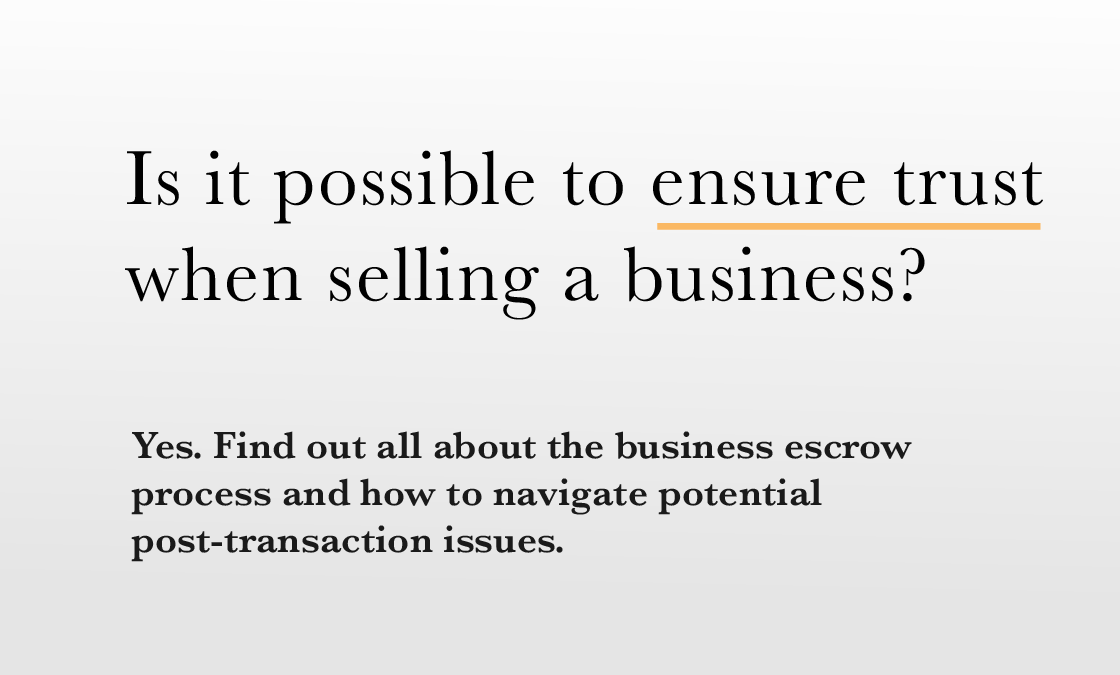During a big purchase or the sale of your business, you may wonder how to ensure trust between you and the other person in the transaction. Typically, this is when your broker, real estate agent, or business partner introduces you to an escrow agent. But what does an escrow agent actually do and why would you want to utilize one? And how do you protect yourself post transaction, with or without the help of an escrow?
Escrow Agent
An escrow agent is the third party to a transaction. Their only goal is to ensure that all conditions of the sale are met. They do this by holding money, deposits, down payments, deeds, bills of sale, and other important documentation until the other party has fulfilled their duties.
For example, an escrow agent for a home sale will deposit the buyer’s funds and hold onto the money until the transaction closes or the transaction has been cancelled. This does two things:
- It gives confidence to the seller because they know there is actual money behind the buyer’s intent.
- it prevents the buyer from potentially sending a check the day of and then instructing the bank not to pay once the signatures have been secured.
The typical pre-sale issues are:
- Problems with buyer’s ability to procure funds;
- pre-sale due-diligence finds issues that make the deal untenable; and
- final contract terms cannot be agreed upon.
Having an escrow agent can resolve these issues by holding the funds and documents until these issues have been resolved or the deal has been called off and each party has their respective property returned to them.
Escrow Fee
The escrow fees are typically split between the two parties, which makes sense because each party will typically have a set of instructions for the escrow agent. Those instructions can be as simple as “release X amount of funds when both sides have signed the sales agreement,” or the parties can enter into an extensive escrow agreement. Escrow agreements lay out the powers of the escrow agent, dictate the specific times and events that will cause distribution of documents and monies, and outline the representations and responsibilities of the seller and buyer during the transaction. The last reason, the outlining of the representations and responsibilities of the parties, may be enough to warrant entering into such an agreement because now there is another document defining what expectations must be met by each party.
What if you are selling both the business and the property it is located in? You don’t need two separate escrow and sale agreements, but it may make sense to have separate escrow agents since one would be familiar with the requirements for a sale of a business and the other would be familiar with the requirements of the purchase and sale of land.
Potential Post-Transaction Issues
Though escrow plays a significant role up until closing, there is an equally significant set of issues post-closing that may result in certain miscues and problems without proper guidance. Typical post-transaction issues include violations of representations and warranties made regarding the sales agreement, significant drops in value of the purchased asset, lingering issues from certain closing conditions, and potential disputes of post-closing responsibilities for known liabilities which the parties knew about but did not disclose in the acquisition agreement.
An escrow agent can help with some of these issues. An agreement can be structured so the escrow agent only releases a certain amount of money at the time the transaction is completed, and the rest at a later designated time. For example, if there is hesitation as to the vitality of a business that is being purchased, you could pay half of the transaction amount up front, and if the business meets at least 75% of estimated earnings in 6 months, then the remaining amount of money can be released. What we are attempting to protect the client from is a significant drop in the value of the purchased asset. Sometimes, all the due diligence in the world cannot protect the buyer from a drop in value if the information they received from the seller is dubious or incorrect. This false information leads into the issue of violations of representations and warranties.
In an acquisition agreement, you will have to make representations and warranties as to capitalization of a business, intellectual property ownership, financial statements, general compliance, outstanding employment issues, ERISA, and relationships with vendors and any outstanding contracts. The key component is when a party must make a statement that no representation or warranty contains any untrue statement or omits to state a material fact. That statement can have consequences down the road if it can be shown either party omitted material facts or made untrue statements about certain issues, thus violating a representation or warranty. Now, these representation and warranty issues can be insured against, but this covers worst case scenarios and costs go beyond just the deductible payments. There also may be questions of whether such problems are even covered. In this instance, a delayed payment through the escrow agent may give time to fully vet and understand if any representations or warranties are going to be violated. After running the business for six months, you will have a large enough data set to judge if such issues may be a problem, and you’ll be much happier paying for something you know has consistent and uninterrupted value.
Closing conditions are standards that must be met in order for money to be distributed by the escrow agent and for the deal to be signed and completed. Sometimes the parties are in such a hurry to execute a deal that some of the conditions are met only nominally. To guard against this, pay attention to conditions that have been put in place, and use them as a checklist before signing the final acquisition agreement. A robust set of closing conditions can help mitigate the final issue of post-transaction dispute involving known liabilities. If a liability is known by either party prior to the completion of the transaction, it’s in both parties’ interests to make the handling of such issue a condition to closing.
For example, the parties may make the assignment of a lease a condition to closing, or require the other party to submit to an audit to ensure all the finances and logistics are in order. The primary goal for the closing conditions and resolving known issues is to limit exposure for both parties so litigation does not happen immediately after the signing of the documents.
As we have explained, there are many pitfalls when it comes to running a business or using a property post-transaction. Some may be remedied by the utilization of an escrow agent and the various ways the escrow agreement can be structured. But most of the all, these issues require careful consideration by both the client and their attorneys. Otherwise, you’ll be stuck in litigation long after the parties signed documents.

![Wrap Up | Behind the Buy [8/8] [309]](https://www.pashalaw.com/wp-content/uploads/2020/11/Pasha_BehindTheBuy_Episode8-1024x683.jpg)
![Is it all over? | Behind the Buy [7/8] [308]](https://www.pashalaw.com/wp-content/uploads/2020/09/iStock-1153248856-overlay-scaled-1024x683.jpg)
![Fight for Your [Trademark] Rights | Behind the Buy [6/8] [307]](https://www.pashalaw.com/wp-content/uploads/2020/07/Fight-for-your-trademark-right-1024x683.jpg)
![Mo’ Investigation Mo’ Problems | Behind the Buy [4/8] [305]](https://www.pashalaw.com/wp-content/uploads/2020/05/interrobang-1-scaled-1024x683.jpg)

![Broker or Joker | Behind the Buy [3/8] [304] Behind the buy - Broker or Joker](https://www.pashalaw.com/wp-content/uploads/2020/04/Joker-or-Broker-1-1024x633.jpg)
![Why the Business Buying Process is Like a Wedding?: A Legal Guide [e299]](https://www.pashalaw.com/wp-content/uploads/2019/03/futura-1024x576.jpg)

![Why California Employers Should Avoid Re-Hire Clauses [e184] Why California Employers Should Avoid Re-Hire Clauses](https://www.pashalaw.com/wp-content/uploads/2015/05/Why-California-Employers-Should-Avoid-Re-Hire-Clauses-.jpg)
![The Prize for Winning American Idol? A One Sided Contract [e148] The Prize for Winning American Idol? A One Sided Contract](https://www.pashalaw.com/wp-content/uploads/2015/02/The-Prize-for-Winning-American-Idol-A-One-Sided-Contract.jpg)




![Law in the Digital Age: Exploring the Legal Intricacies of Artificial Intelligence [e323]](https://www.pashalaw.com/wp-content/uploads/2023/11/WhatsApp-Image-2023-11-21-at-13.24.49_4a326c9e-300x212.jpg)
![Unraveling the Workforce: Navigating the Aftermath of Mass Layoffs [e322]](https://www.pashalaw.com/wp-content/uploads/2023/07/Untitled-design-23-300x212.png)
![Return to the Office vs. Remote: What Can Employers Legally Enforce? [e321]](https://www.pashalaw.com/wp-content/uploads/2023/01/Pasha_LSSB_321_banner-300x212.jpg)
![Explaining the Hans Niemann Chess Lawsuit v. Magnus Carlsen [e320]](https://www.pashalaw.com/wp-content/uploads/2022/10/LAWYER-EXPLAINS-7-300x169.png)
![California v. Texas: Which is Better for Business? [313]](https://www.pashalaw.com/wp-content/uploads/2021/07/Pasha_LSSB_CaliforniaVSTexas-300x212.jpg)
![Buyers vs. Sellers: Negotiating Mergers & Acquisitions [e319]](https://www.pashalaw.com/wp-content/uploads/2022/06/Pasha_LSSB_BuyersVsSellers_banner-300x212.jpg)
![Employers vs. Employees: When Are Employment Restrictions Fair? [e318]](https://www.pashalaw.com/wp-content/uploads/2022/05/Pasha_LSSB_EmployeesVsEmployers_banner-1-300x212.jpg)
![Vaccine Mandates Supreme Court Rulings [E317]](https://www.pashalaw.com/wp-content/uploads/2022/02/WhatsApp-Image-2022-02-11-at-4.10.32-PM-300x212.jpeg)
![Business of Healthcare [e316]](https://www.pashalaw.com/wp-content/uploads/2021/11/Pasha_LSSB_BusinessofHealthcare_banner-300x212.jpg)
![Social Media and the Law [e315]](https://www.pashalaw.com/wp-content/uploads/2021/10/WhatsApp-Image-2021-10-06-at-1.43.08-PM-300x212.jpeg)
![Defining NDA Boundaries: When does it go too far? [e314]](https://www.pashalaw.com/wp-content/uploads/2021/09/Pasha_LSSB_NDA_WordPress-2-300x212.jpg)
![More Than a Mistake: Business Blunders to Avoid [312] Top Five Business Blunders](https://www.pashalaw.com/wp-content/uploads/2021/06/Pasha_LSSB_Blunders_WP-1-300x212.jpg)
![Is There a Right Way to Fire an Employee? We Ask the Experts [311]](https://www.pashalaw.com/wp-content/uploads/2021/02/Pasha_LSSB_FireAnEmployee_Website-300x200.jpg)
![The New Frontier: Navigating Business Law During a Pandemic [310]](https://www.pashalaw.com/wp-content/uploads/2020/12/Pasha_LSSB_Epidsode308_Covid_Web-1-300x200.jpg)
![Wrap Up | Behind the Buy [8/8] [309]](https://www.pashalaw.com/wp-content/uploads/2020/11/Pasha_BehindTheBuy_Episode8-300x200.jpg)
![Is it all over? | Behind the Buy [7/8] [308]](https://www.pashalaw.com/wp-content/uploads/2020/09/iStock-1153248856-overlay-scaled-300x200.jpg)
![Fight for Your [Trademark] Rights | Behind the Buy [6/8] [307]](https://www.pashalaw.com/wp-content/uploads/2020/07/Fight-for-your-trademark-right-300x200.jpg)
![They Let It Slip | Behind the Buy [5/8] [306]](https://www.pashalaw.com/wp-content/uploads/2020/06/Behind-the-buy-they-let-it-slip-300x200.jpg)
![Mo’ Investigation Mo’ Problems | Behind the Buy [4/8] [305]](https://www.pashalaw.com/wp-content/uploads/2020/05/interrobang-1-scaled-300x200.jpg)
![Broker or Joker | Behind the Buy [3/8] [304] Behind the buy - Broker or Joker](https://www.pashalaw.com/wp-content/uploads/2020/04/Joker-or-Broker-1-300x185.jpg)
![Intentions Are Nothing Without a Signature | Behind the Buy [2/8] [303]](https://www.pashalaw.com/wp-content/uploads/2020/04/intentions-are-nothing-without-a-signature-300x185.jpg)
![From First Steps to Final Signatures | Behind the Buy [1/8] [302]](https://www.pashalaw.com/wp-content/uploads/2020/04/first-steps-to-final-signatures-300x185.jpg)
![The Dark-side of GrubHub’s (and others’) Relationship with Restaurants [e301]](https://www.pashalaw.com/wp-content/uploads/2015/04/When-Competition-Goes-Too-Far-Ice-Cream-Truck-Edition-300x201.jpg)
![Ultimate Legal Breakdown of Internet Law & the Subscription Business Model [e300]](https://www.pashalaw.com/wp-content/uploads/2019/05/Ultimate-Legal-Breakdown-of-Internet-Law-the-Subscription-Business-Model-300x196.jpg)
![Why the Business Buying Process is Like a Wedding?: A Legal Guide [e299]](https://www.pashalaw.com/wp-content/uploads/2019/03/futura-300x169.jpg)
![Will Crowdfunding and General Solicitation Change How Companies Raise Capital? [e298]](https://www.pashalaw.com/wp-content/uploads/2018/11/Will-Crowdfunding-and-General-Solicitation-Change-How-Companies-Raise-Capital-300x159.jpg)
![Pirates, Pilots, and Passwords: Flight Sim Labs Navigates Legal Issues (w/ Marc Hoag as Guest) [e297]](https://www.pashalaw.com/wp-content/uploads/2018/07/flight-sim-labs-300x159.jpg)
![Facebook, Zuckerberg, and the Data Privacy Dilemma [e296] User data, data breach photo by Pete Souza)](https://www.pashalaw.com/wp-content/uploads/2018/04/data-300x159.jpg)
![What To Do When Your Business Is Raided By ICE [e295] I.C.E Raids business](https://www.pashalaw.com/wp-content/uploads/2018/02/ice-cover-300x159.jpg)
![General Contractors & Subcontractors in California – What you need to know [e294]](https://www.pashalaw.com/wp-content/uploads/2018/01/iStock-666960952-300x200.jpg)
![Mattress Giants v. Sleepoplis: The War On Getting You To Bed [e293]](https://www.pashalaw.com/wp-content/uploads/2017/12/sleepopolis-300x159.jpg)
![The Harassment Watershed [e292]](https://www.pashalaw.com/wp-content/uploads/2017/12/me-2-300x219.jpg)
![Investing and Immigrating to the United States: The EB-5 Green Card [e291]](https://www.pashalaw.com/wp-content/uploads/2012/12/eb-5-investment-visa-program-300x159.jpg)
![Responding to a Government Requests (Inquiries, Warrants, etc.) [e290] How to respond to government requests, inquiries, warrants and investigation](https://www.pashalaw.com/wp-content/uploads/2017/10/iStock_57303576_LARGE-300x200.jpg)
![Ultimate Legal Breakdown: Employee Dress Codes [e289]](https://www.pashalaw.com/wp-content/uploads/2017/08/Ultimate-Legal-Breakdown-Template-1-300x159.jpg)
![Ultimate Legal Breakdown: Negative Online Reviews [e288]](https://www.pashalaw.com/wp-content/uploads/2017/06/Ultimate-Legal-Breakdown-Online-Reviews-1-300x159.jpg)
![Ultimate Legal Breakdown: Social Media Marketing [e287]](https://www.pashalaw.com/wp-content/uploads/2017/06/ultimate-legal-breakdown-social-media-marketing-blur-300x159.jpg)
![Ultimate Legal Breakdown: Subscription Box Businesses [e286]](https://www.pashalaw.com/wp-content/uploads/2017/03/ultimate-legal-breakdown-subscription-box-services-pasha-law-2-300x159.jpg)
![Can Companies Protect Against Foreseeable Misuse of Apps [e285]](https://www.pashalaw.com/wp-content/uploads/2017/01/iStock-505291242-300x176.jpg)
![When Using Celebrity Deaths for Brand Promotion Crosses the Line [e284]](https://www.pashalaw.com/wp-content/uploads/2017/01/celbrity-300x159.png)
![Are Employers Liable When Employees Are Accused of Racism? [e283] Racist Employee](https://www.pashalaw.com/wp-content/uploads/2016/12/Are-employers-liable-when-an-employees-are-accused-of-racism-300x159.jpg)
![How Businesses Should Handle Unpaid Bills from Clients [e282] What to do when a client won't pay.](https://www.pashalaw.com/wp-content/uploads/2016/12/How-Businesses-Should-Handle-Unpaid-Bills-to-Clients-300x159.png)
![Can Employers Implement English Only Policies Without Discriminating? [e281]](https://www.pashalaw.com/wp-content/uploads/2016/11/Can-Employers-Impliment-English-Only-Policies-Without-Discriminating-300x159.jpg)
![Why You May No Longer See Actors’ Ages on Their IMDB Page [e280]](https://www.pashalaw.com/wp-content/uploads/2016/10/IMDB-AGE2-300x159.jpg)
![Airbnb’s Discrimination Problem and How Businesses Can Relate [e279]](https://www.pashalaw.com/wp-content/uploads/2016/09/airbnb-300x159.jpg)
![What To Do When Your Amazon Account Gets Suspended [e278]](https://www.pashalaw.com/wp-content/uploads/2016/09/What-To-Do-When-Your-Amazon-Account-Gets-Suspended-1-300x200.jpg)
![How Independent Artists Reacted to Fashion Mogul Zara’s Alleged Infringement [e277]](https://www.pashalaw.com/wp-content/uploads/2016/08/How-Independent-Artists-Reacted-to-Fashion-Mogul-Zaras-Alleged-Infringement--300x159.jpg)
![Can Brave’s Ad Replacing Software Defeat Newspapers and Copyright Law? [e276]](https://www.pashalaw.com/wp-content/uploads/2016/08/Can-Braves-Ad-Replacing-Software-Defeat-Newspapers-and-Copyright-Law-300x159.jpg)
![Why The Roger Ailes Sexual Harassment Lawsuit Is Far From Normal [e275]](https://www.pashalaw.com/wp-content/uploads/2016/07/WHY-THE-ROGER-AILES-SEXUAL-HARASSMENT-LAWSUIT-IS-FAR-FROM-NORMAL-300x159.jpeg)
![How Starbucks Turned Coveted Employer to Employee Complaints [e274]](https://www.pashalaw.com/wp-content/uploads/2016/07/iStock_54169990_LARGE-300x210.jpg)
